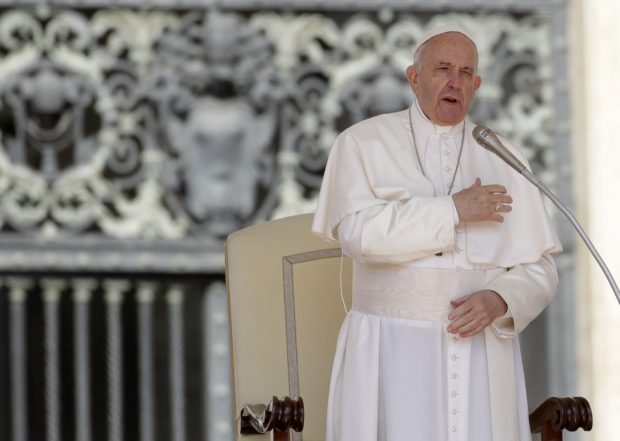
FILE PHOTO (AP Photo/Alessandra Tarantino)
In his famous work, “Anonymous Christianity,” the great Jesuit theologian Karl Rahner claims that the benefits of Christ’s redemptive sacrifice are not confined to the boundaries of any particular religious tradition or by our awareness or acceptance of Christian doctrine.
To which German theologian Hans Küng responded by saying that “any sincere Jew, Muslim or atheist would assert it is presumptuous to claim that he is an ‘anonymous Christian.”
Recall now the fatherly presence of Pope Francis last month in an ecumenical nation. Singapore is a city state like the Vatican, but unlike the Vatican, it is a sovereign nation of minority Catholics living in harmony with various religious groups.
Subscribe to our daily newsletter
During the “Interreligious Meeting with Young People” in that nation, the Holy Father highlighted the importance of interfaith dialogue and the pursuit of peace, emphasizing that different religions can lead individuals to God.
The Holy Father articulated his thoughts and said, “All religions are paths to God.”
In his long-standing commitment to fostering a spirit of collaboration and mutual respect among various faith traditions, His Holiness suggested the possibility of the grace of salvation outside the boundaries of the Christian community, nearly along the line of reasoning of Karl Rahner’s “Anonymous Christianity.”
ADVERTISEMENTNonetheless, this single statement has sparked significant discussions and even outrageous debates, particularly concerning its implications for Catholic teaching.
For centuries until Vatican Council II (1962-1965), the prevailing doctrine was this: Extra Ecclesiam nulla salus, or “outside the Church there is no salvation.”
While some critics view the Pope’s statement as a deviation from traditional Catholic doctrine, a closer examination of Pope Francis’ inclusivism is deemed consistent with the teachings of Vatican II, particularly Lumen Gentium (LG), the Dogmatic Constitution on the Church, Nostra Aetate (NA), the Declaration on Interreligious Dialogue and Ad Gentes (AG), the Decree on the Mission of the Church.
ADVERTISEMENT“Those who have not yet received the Gospel are related in various ways to the People of God” (LG 16).
Others may be saved “who, through no fault of their own, do not know the Gospel of Christ or His Church, yet sincerely seek God and, moved by grace, strive by their deeds to do His will as it is known to them through the dictates of conscience” (LG 16).
“Nor does Divine Providence deny the helps necessary for salvation to those who, without blame on their part, have not yet arrived at an explicit knowledge of God and with His grace strive to live a good life” (LG 16).
“One final goal [of all] is God. His providence, His manifestations of goodness, His saving design extend to all men, until that time when the elect will be united in the Holy City, the city ablaze with the glory of God, where the nations will walk in His light” (NA 1).
“The seeds of the Word which lie hidden among their fellows [other religious traditions…] sometimes planted by God in ancient cultures already prior to the preaching of the Gospel” (AG 18).
The Pope’s statement is not off the cuff. That “all religions are paths to God” must be viewed in the context of his pastoral ecclesiology and synodality. The only correct interpretation is along the lines of the hermeneutic of continuity and the hermeneutic of reform.
First, it means the Holy Father is committed to continuing the complete implementation of the pastoral ecclesiology and reforms of Vatican II.
And secondly, while all the baptized are specifically called to take part in the synodal process, no one—no matter what their religious affiliations are—is excluded. It means that not only those who believe in Christ are called to participate, for Vatican II teaches with authority that “all human beings are called to the new people of God” (Lumen Gentium, 13), hence listening to and conversing with all religions are meaningful.
Synodality and dialogue with other religions do not mean forgetting that Jesus Christ is the definitive revelation of God, the one Savior of all, and the unique Mediator between God and humankind (Catechism of the Catholic Church 480).
Synodality and the attitude of respect and dialogue, far from opposing the proclamation of the Gospel, prepare it like planting the seed of the Word (AG 18).
If we scrutinize more deeply, Pope Francis’ statement, “All religions are paths to God,” encourages a humble acknowledgment that God can operate in ways beyond human comprehension and within diverse cultural and spiritual contexts.
“With men this is impossible, but with God all things are possible” (Matthew 19:26).
José Mario Bautista Maximiano is the author of the 3-volume work on Church Reforms (Claretian, 2023, 2024, 2025) and the author of the 3-volume work on 500 Years of Christianity in the Philippines (Claretian, 2021, 2022). Thaddeus Noel G. Laput is a Catholic philosopher and a hospice chaplain in Los Angeles, California.
Want stories like this delivered straight to your inbox? Stay informed. Stay ahead. Subscribe to InqMORNING epoch game
MORE STORIES NASA offers $3 million prize in recycling challenge Bianca Bustamante joins NEOM McLaren for Valencia Women’s Test Alex Eala bounces back at WTA 250 Guangzhou Open Don't miss out on the latest news and information.